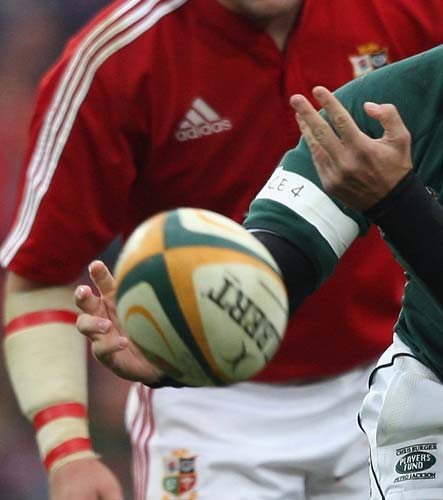Springboks fined for Botha armband protest

South Africa have been fined and found guilty of bringing the game into disrepute for protesting Bakkies Botha's suspension by wearing armbands during the third Lions test.
The Springboks escaped a possible suspension from the next World Cup in New Zealand in 2011, however, after a more serious charge was dismissed.
The punishment, which included a £1000 ($2448) fine for team captain John Smit and £10,000 for the South African Rugby Union, was announced by the International Rugby Board after a hearing in Dublin attended by Smith and South Africa coach Peter de Villiers. The other players were each fined £200 pounds.
The charges stem from the Springboks' decision to wear armbands in the third test against the British and Irish Lions on July 4 marked with the words "Justice 4 Bakkies" to protest the two-week suspension for lock forward Botha.
Botha was cited for a challenge on Lions prop Adam Jones which left the Welshman with a dislocated shoulder during the Springboks' 28-25 victory at Pretoria in the second test.
Although the independent committee dismissed a misconduct charge for technical reasons, it said the misconduct was serious in nature and there had been no formal apology, acknowledgment, contrition or clarification from either the players or the South African Rugby Union.
"The playing arena is no place for protest," the three-man committee said in its ruling, adding that the wearing of the armbands "showed a serious lack of respect and consideration for their opponents".
The Independent Committee said that, had it not been for the legal technicalities, both SARU and the Springbok players and management would have faced much more serious sanctions.
That included a more severe fine in the case of SARU and the suspension of the Springbok players and management from the World Cup in 2011.
It added, however, such a ban would have remained suspended in the absence of further acts of misconduct.
The committee said it believed its decision would deter all rugby players from adopting such an unwise and ill-considered way to make their feelings clear to the IRB, or the general rugby watching public.
The IRB said it welcomed the guilty verdict but was disappointed with the punishments.
"The IRB is extremely disappointed at the level of sanctions imposed against the South African Rugby Union and its players in light of the clear findings that they have brought the game of rugby into disrepute and acted in a manner which is prejudicial to the best interests of the IRB and the game of rugby," it said in a statement.
"The IRB is giving urgent and serious consideration to the decision of the Independent Committee and the further options available to it, which include whether or not to bring an appeal against the level of sanctions imposed by the Committee."
SARU issued a statement saying it noted the outcome of the Committee but would not respond until it had reviewed the full findings.
Sourced from: The New Zealand Herald
Join our commenting forum
Join thought-provoking conversations, follow other Independent readers and see their replies
Comments
Bookmark popover
Removed from bookmarks